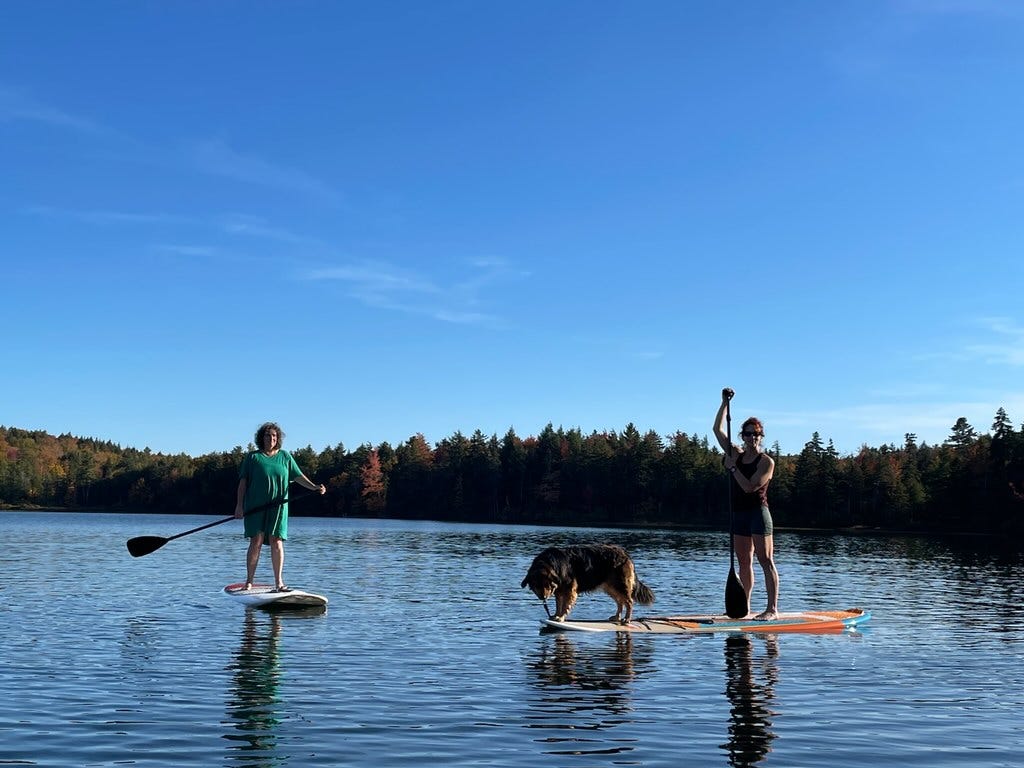Romancing the Crone
In the throes of perimenopause, Diana Whitney embraces a new/old identity.
I’ve been tiptoeing up to the crone for a few years now. I glimpse her shadow sometimes when I walk past a window. She’s out gathering herbs or tending the garden, pausing in a patch of sun, steady as a birch in winter, head crowned in silver.
At 49, I find myself awash in agitation, riding the storms of perimenopause. Nothing prepared me for the consuming cycles of rage and sorrow, the erratic bleeding, potent night sweats, all the ungraceful ways I’m beholden to time and my body.
What does it mean to “age gracefully” in a misogynistic, youth-worshiping culture? I try not to dread what’s to come. Try not to shy from the face in the mirror, gradually changing into an elder. Where did those lines etched between my brows come from? Who says they’re a hallmark of shame, something to be smoothed, needled, scrubbed out of existence? Maybe they’re a kind of rune, bearing an ancient message.
*
My friend Erin loves the word “crone.” She’s ahead of me on the journey, having already celebrated her 50th eight years ago at a wild, multi-generational dance party at the Stone Church, grooving with friends in a badass jumpsuit, glitter on her cheeks, eyes unadorned, long red hair loose down her back. Erin is puzzled by my crone resistance, says she’s always found the archetype empowering.
Where did those lines etched between my brows come from? Who says they’re a hallmark of shame, something to be smoothed, needled, scrubbed out of existence? Maybe they’re a kind of rune, bearing an ancient message.
We plan to go paddle-boarding and talk about it, all of it—aging, menopause, sexuality, self-knowledge, society’s expectations that we become invisible, the possibility of magic in our elder years.
I meet Erin for the crone paddle at the South Pond fishing access. We’ve pushed it off till September— sudden chill in the air, sunset clouds, a sickle moon slung glistening in the sky. Waves whip the water as we pack our dry bags, launch our boards. We take off paddling hard into the headwind, looking for a calm cove.
“Menopause was fast and furious for me,” she says. “I feel more focused now, all that energy freed up.”
For the first time, I wonder if I won’t mourn the blood, if my cycling moods and flow are something I no longer need. I’ve been bleeding, emoting, riding the wheel of hormonal angst since I got my period at age 11. What will it mean to be liberated from the whole project?
My friend Erin loves the word “crone.” She’s ahead of me on the journey, having already celebrated her 50th eight years ago…Erin is puzzled by my crone resistance, says she’s always found the archetype empowering.
Erin sounds calm and resolved, her green eyes lit with intensity. She’s made us mango margaritas in a stainless flask. We slip into the lee of the wind and sit down, floating, legs stretched across each other’s boards. I’ve brought soft cheese and fresh garden carrots, crackers and olives. We snack and drift and talk on our makeshift raft, watching the sky change color.
*
I’ve always cringed at the word “crone.” To my poet’s ear, it’s an ugly syllable–rhyming with “bone” and “alone,” recalling the shady commerce of “crony.” I’d assumed this was a simple predilection for certain sounds in language, but maybe it’s centuries of internalized misogyny masquerading as aesthetic taste.
A quick search for the word’s origins reveals “crone” is derived from Vulgar Latin “carrion”—a dead body, putrefying flesh. Also from Anglo-French—“carrion, carcass; an old ewe.” Is etymology the source of my visceral revulsion? Crone was used in Middle English as a strong term of abuse for a feeble and withered old woman. A cantankerous woman. The kind of woman who endangered her life and livelihood in medieval times by speaking her mind, refusing to be docile or silent.
But go back further, and crone carries a different ancestry. According to feminist author Barbara G. Walker, “The Crone’s title was related to the word ‘crown,’ and she represented the power of the ancient tribal matriarch who made the moral and legal decisions for her subjects and descendants.”
Now we’re talking. This queenly figure sounds like the energy Erin is channeling. It turns out Walker wrote a whole book on the subject back in the 80s:
“Crone is… the power, passion, and purpose of ancient female wisdom… the crowning triple phase of the ancient Triple Goddess: Maiden/Mother/Crone. It was the medieval metamorphosis of the wise woman into the witch that changed the word Crone from a compliment to an insult and established the stereotype of malevolent old womanhood that continues to haunt elder women today.” - The Crone: Women of Age, Wisdom, and Power
I realize I’m being haunted by some archaic, misogynistic bullshit. And that crone-hatred is connected to our cultural dread of menopause, our fear of a woman freed from her fertility, untethered to the burdens and expectations of pregnancy, birth, and child-raising. I start reading OB/GYN experts like Dr. Jen Gunter, a fierce advocate for women’s health, and thrill to this new perspective:
“The culture of silence around menopause in our patriarchal society is something to behold…,” she writes in The Menopause Manifesto. “Menopause doesn’t even rate the shame that our culture gives to the vulva and the vagina. Apparently, there is nothing of lower value than an aging woman’s body, and many in our society treat menopause not as a phase of life, but rather as a phase of death. A sort of predeath.”
*
Fired up, I go see my midwife and learn there is a phenomenon called menopausal “zest.” I love the citrus-y tang of that word, a brightness you can almost taste.
Who knew that some women feel a burst of happiness and vitality after the change, that Erin’s experience is not usual?
In The Woman’s Encyclopedia of Myths and Secrets (a tome of treasures I discovered in my 20s), Barbara Walker again defines the Crone:
“The Crone also represented the third (post-menopausal) phase of women’s lives... Because it was believed that women became very wise when they no longer shed the lunar ‘wise blood’ but kept it within, the Crone was usually a Goddess of Wisdom.”
How extraordinary, to imagine my own blood as a wise elixir! To believe that containing it could be a source of insight!
I’ve always cringed at the word “crone.” To my poet’s ear, it’s an ugly syllable–rhyming with “bone” and “alone,” recalling the shady commerce of “crony.” I’d assumed this was a simple predilection for certain sounds in language, but maybe it’s centuries of internalized misogyny masquerading as aesthetic taste.
I refuse to accept a silent pre-death. I resolve to seek out powerful wise woman role models when I can’t find them in my own family. My two tiny grandmothers are long gone; only ghosts of their stories remain. I can see them poised in their neat skirts and blouses, 4’10” and 5’ tall respectively. Both carried the weight of family secrets and struggled with anxiety. Both lived under the rule of their authoritarian husbands, bound by the domestic strictures of their day.
As for my radiant hippie mother, she succumbed to grief and depression eighteen years ago, at age 60, after my father died of a heart attack. Depression slid into an early Alzheimer’s diagnosis, and her decline was steady then swift, robbing her of language and the ability to move, her statuesque figure now hunched and skeletal. I hold her hand as she sits propped in a recliner, eyes closed, spoon-fed by caregivers. I know she exists beyond the veil, already half in another world. But I can’t find the crowning power in this disease.
So I count the crones in my life who shine with passion and wisdom. Donna rows on the Potomac River at dawn, falls in love again at age 70, protests the end of Roe outside Kavanaugh’s house with a crowd of feisty elders. Erin designs and builds tiny houses, teaches across the country, and organizes vibrant community art-making. Michelle, an artist who traveled to the Arctic and swam with icebergs, is writing a cli-fi fantasy novel. At 72, Nancy supports survivors of suicide, sends handwritten letters to all her friends, and works, steadfast, on her second memoir.
As I cross over to 50 the crone calls to me—free from shame and the shallow trappings of femininity. Unadorned, hair wild with river water, sun-lined and moon-weathered, she carries her books of runes and spells.
The circle widens. I know poet crones like Ruth Stone and yoga crones like Täo Porchon-Lynch. I discover dream guide crones leading inner journeys and activist crones smuggling abortion pills from Mexico. I reckon them up, a coven across space and time.
My best college friend Andrea, 49, calls us philosopher-queens. It’s time to reclaim wisdom as our birthright and wear the crown without apology.
As I cross over to 50 the crone calls to me—free from shame and the shallow trappings of femininity. Unadorned, hair wild with river water, sun-lined and moon-weathered, she carries her books of runes and spells. She’s kin with the Wild Woman archetype Clarissa Pinkola Estes channeled in Women Who Run with the Wolves. The healer and dream tender, the storyteller and boundary protector.
I don’t know when I will embody her, but I’m getting closer. The frost takes the garden. My blood doesn’t come. A fire within me burns at night, igniting the bed with the light of transformation.









Great article, thank you. Now at 73, I remember my early 50's thinking, somewhat like you, that the word crone was distasteful, seemed brittle as it fell unwillingly from my tongue. I write this as I just got up, well about an hour ago. Now having my morning coffee, complete with maple syrup, and eqaul pinches of turmeric, cloves and cinnamon. Sixteen yummy ounces to be clear. This is my morning ritual, as I write, either responses or my own writing. And while doing so, the little aches and pains slide form my body. This is all followed by meditation and yoga. My day unfolds slowly, gracefully, but it still unfolds.Do i love every but of it? Of course not, but I wouldn't trade it for my younger self. My hair is finally showing some grey, my hios are spreading like ground cover over my own personal landscape. And I am most grateful to continue on my self discovery, longing to in my last breath, simply unzip this coat and fly. Be well, many blessings on your road
This is gorgeously written. Thank you. Through some combination of personal and astrological temperament I find myself, despite any recurrent angst about my aging body, so happy overall to be marching into my crone-dom. It's taken a such a long time to get out from under the weight of so many burdens-- family of origin trauma, which led to adult trauma, societal mores and expectations, my own willfulness and impatience. I feel like this last third (half if I'm lucky) I get to actually enjoy myself and revel in the things and people that truly feed and delight me.
I wouldn't trade a fitter, faster, harder body for the poignant softness I feel for myself and other people these days, or the clarity of purpose I feel now that all that extraneous dross has started to fall away.